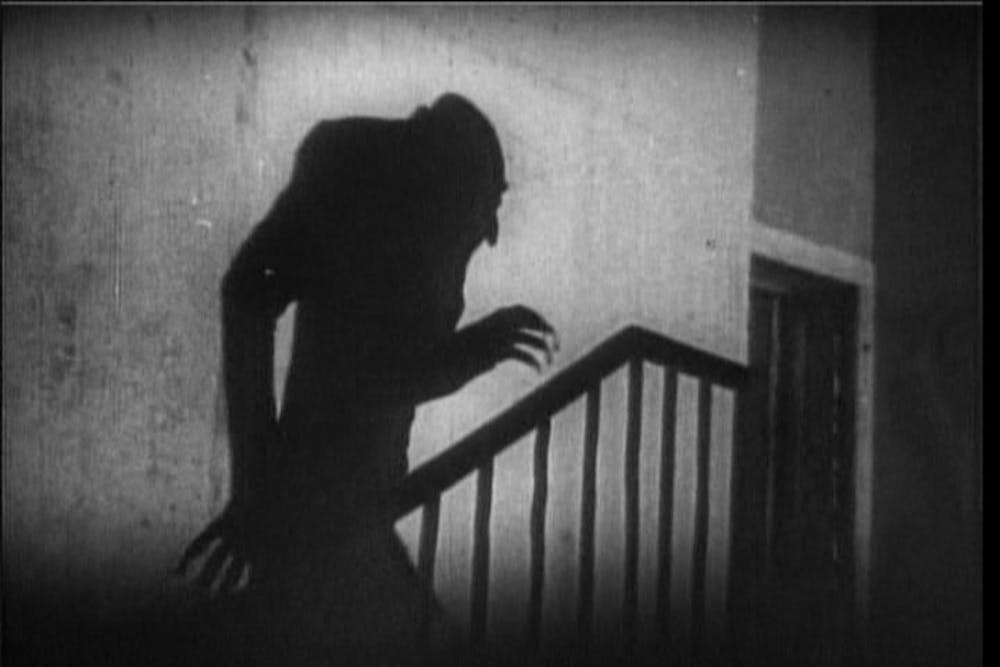At this point, just over a day has passed since I watched the 2024 film Nosferatu. I’ve let it sit. I’ve slept on it. I’ve given myself time to process everything and really let it marinate. And while I admit that I was initially dissatisfied, over the span of those 24 hours, I’ve found myself harboring a newfound appreciation for the movie.
Nosferatu’s premise was good, albeit slightly formulaic. Like most horror films, its basic plot was twofold: First, a monster appears, and, second, the main characters struggle to defeat said monster without dying horribly in the process. A young girl, Ellen (Lily-Rose Depp), summons and pledges herself to the vampire Count Orlok (Bill Skarsgård) to relieve her loneliness. Years later, Ellen is happily married to Thomas (Nicholas Hoult) but still suffers nightmares as a result of her lingering connection with Orlok. When Thomas is sent by his employer to Transylvania to sell Orlok a manor, Orlok decides to pursue Ellen and force her to repledge herself to him.
It was immediately evident from the opening scene of the film that the acting would be amazing. Depp’s ability to transform into a character that flips between a vampire’s possessed lover and a loyal wife is really impressive. I don’t know how she was able to roll her eyes back into her head while convulsing, but it’s truly a skill. I also thought that Hoult played the role of the devoted husband well. His facial expressions and mannerisms effectively built tension and fear throughout the film.
The movie was also filmed very aesthetically. Every shot felt intentional and artistic. I get the feeling that I could have paused the film at any point and the shot would have been stunning. I especially loved when a character would open the lid of Orlok’s coffin, because the camera would dip down into it and go dark for a couple seconds. It created an eerie effect of falling into an abyss that was really cool to watch.
However, I initially struggled with the film’s characterization and depiction of Orlok. I understand that he’s meant to be horrifying and repulsive, but I found him underwhelming and almost comical. Yes, he was sporting horrible cataracts, rotting skin and fangs, but he also had a wheeze to rival Darth Vader and an oddly voluminous handlebar mustache. Am I meant to believe that sometime in his centuries of decay, Orlok discovered mustache wax and grooming scissors to maintain his immaculately-coiffed face piece? The man was basically naked for most of the movie, yet apparently he drew the line at improper facial hair maintenance?
But mostly, I found his character confusing and shallow. Orlok’s entire existence revolved around Ellen, to the point at which meeting Thomas spurred him to ship himself in his coffin across the ocean to force her to renew her vows to him. Does he have nothing else going for him? I mean, I get it, she’s Lily-Rose Depp, but come on. The obsession with Ellen didn’t really make sense to me when it seemed like there were plenty of men and women to terrorize and drain of blood all around him.
Similarly, I was confused by the ending of the film. Why did Ellen choose to die with Orlok? What did her sacrifice mean? Upon further thought, however, the movie began to make more sense when I thought about it like this: Orlok represents the shame Ellen feels for pursuing her sexual desires. Ultimately, Ellen has to make a choice: She can either give in to Orlok and sacrifice herself, or she can fight alongside Thomas to defeat Orlok and thereby overcome her shame. Though Thomas accepts Ellen’s past with Orlok, Ellen can’t accept it herself and ultimately chooses self-destruction.
I actually began to accept Orlok’s shallowness when I realized that he isn’t actually a character at all; instead, he is an extension of Ellen. He is one facet of Ellen’s personality that she refuses to accept. His fixation on her, his desire to repossess her and claim her as his, is actually a reflection of Ellen’s refusal to claim the parts of herself she feels ashamed of. So yes, I still think that some of the choices made regarding his appearance were a little silly and unnecessary, but ultimately I came to the conclusion that he exists as an idea more than a serious character.
That being said, I do think that some of the other side characters’ personalities could have been more fleshed out. For example, I would have loved to know more about Anna (Emma Corrin), Ellen’s religious close friend. In one scene, Ellen describes an inexplicable pull to something bigger than herself, referring to her connection with Orlok, and Anna tells her it’s a pull to God. They are interesting foils of each other, and it would have been interesting to pull the thread on what makes them similar and different as women and wives.
I did not expect this movie to be as thought-provoking as it ended up being. I went to see the film for the horror and the hype, and left pondering the societal norms that make women feel ashamed to express their sexuality even to their husbands. If you like mild horror that doubles as social commentary, I would definitely recommend you watch Nosferatu.





